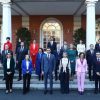By the London technology team
Government computers used to edit critical Wikipedia articles
Channel 4 News revealed that Whitehall computers made several edits to Wikipedia articles relating to high profile crimes and downplayed criticism of the state. Several edits were made to the police shooting of Jean Charles de Menezes, removing criticism of the IPCC investigation into the case and adding in allegations about drug use and his immigration status. The same editor also changed the IPCC’s own Wikipedia entry to make it more closely resemble official messaging.
Other edits made from Government computers included downplaying the murders of Damilola Taylor and Lee Rigby and adding in the convictions of animal rights activists. The IP addresses used could not be traced back to an individual user and the Cabinet Office responded by saying it would not investigate. This comes at a sensitive time, after a civil servant was sacked for editing the Hillsborough Wikipedia article.
This story was reported widely, with stories in Channel 4 News, Guardian, Daily Mail and Huffington Post. Channel 4 have also created the @Whitehalledits twitter account, which will update whenever a Government owned IP address makes a change to a Wikipedia entry. At the time of writing, the most recent edits include, bizarrely, changes to articles for ‘East Stirlingshire FC’ and ‘List of Assassins Creed Characters’.
Controversial plans to link up all Government databases
People are becoming increasingly used to handing over their data to companies in exchange for products or services that would otherwise be more expensive or less personalised. However, does acceptance of such a model of exchange extend to your relationship with the state? Earlier this week, the Telegraph revealed plans to link up thousands of Government databases, on the face of it to provide better services for citizens. There is a misplaced assumption from many that the Government already holds all of your data in one place and is able to cross-reference data held by different departments to complete administrative tasks and provide services, but this is far from the reality. Currently, sharing data across departments requires specific investigatory powers, as governed by the Data Protection Act, making data sharing difficult, if not impossible.
The proposals come from a discussion document produced by the cabinet’s data sharing policy team in April this year and would involve all local authorities, emergency services, schools and government departments merging their databases. The plans suggest that the resulting information could then be subjected to “big data” style collation and analysis techniques to quickly identify issues, better inform policymakers and target help towards those most in need. Proposals suggest employing the kind of customer analysis techniques developed by retailers such as Amazon and Tesco to develop more “intelligent”, “nimble” services at a greatly reduced cost. However, such proposals are proving controversial as they would give officials unprecedented access to citizens’ private data. Furthermore, the civil service’s track record with managing large datasets will not provide reassurance to critics.
‘Right to be forgotten’ attacked and defended
London hosted its first ‘Wikimania!’ festival, public events devoted to everyone’s favourite online encyclopaedia. In one of the higher profile events, and in a series of interviews, Jimmy Wales (who founded Wikipedia) criticised the ‘right to be forgotten judgement’ after 50 Wikipedia articles were submitted for de-listing. Wales called using legal processes to shape how you’re seen online as ‘deeply immoral’ and announced intentions to fight the ruling by publishing articles submitted for de-listing. The Telegraph coverage on the matter is here.
The overall media coverage (and the tech industry’s verdict) on the judgement has been negative, asking questions around freedom of speech and practical implementation. So this is why Doctoral researcher Julia Powles’ article is interesting, sticking up for the ruling in today’s Guardian. She argues that search engines unique role as ‘catalogues or maps of human knowledge’ blurs the line between people’s private (or seemingly private) and public memories. Powles argues that the right to privacy (underpinned by data protection law) is what makes the internet truly free, by setting rules that encourage debate and provide assurance to users by giving consistent guidelines to firms displaying personal information. Her full Guardian article is here.






